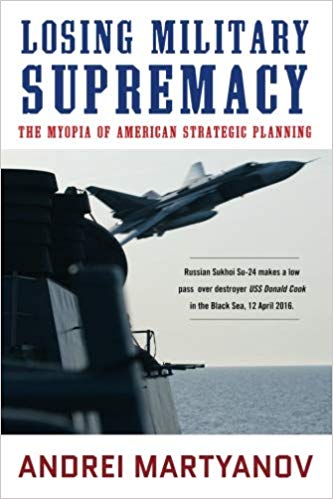Losing Military Supremacy: The Myopia of American Strategic Planning
Book Review

At a time when Russiaphobia is increasing in the United States, the thought that the US could be losing the arms race is far from what most Americans believe. Their dramatic game day fly pasts, hand over the heart anthems and flags in abundance – reinforce the sense of American superiority.
Andrei Martyanov paints a different picture! He does so based both on his history and careful research. He was born in Baku, the capital of Azerbaijan and graduated class of 1985 from the Caspian Naval Academy. He served on ships of the Soviet Coast Guard through the 1990’s. He now lives and works in the United States and blogs on the U.S. Naval Institute’s blog.
His thesis is that the United States has lost global leadership in the arms race because of a weakness in the culture of American leaders. We will get to that. It reminds me of an expression we used in my early career as a salesperson; we counseled one another not to believe our own bull shit! Martyanov argues that Americans believe theirs.
 He begins his book by looking at American myopia through the eyes of Alexis de Tocqueville from almost two centuries ago.
He begins his book by looking at American myopia through the eyes of Alexis de Tocqueville from almost two centuries ago.
Click cover page to order directly from Clarity Press
De Tocqueville was the son of French aristocrats who were fortunate enough to escape the guillotine. He was born in 1805 and when he was 26 got an assignment to travel to America to study the prison system. The French wanted to learn anything they could from the emerging American republican democratic system that could help them replace their old aristocratic order. His two-volume report, Democracy In America, was published in 1835 and 1840 and it’s often required reading in today’s political science courses.
De Tocqueville reported that the American people, even at that early stage in their national development seemed ‘…. insatiable of praise.’ He added “…if you resist their entreaties (to praise them) they fall to praising themselves…. it is impossible to conceive a more troublesome or more garrulous patriotism.”
De Tocqueville saw Americans suffering a sense of self-delusion then which Martyanov sees in the American political class today. These are the people who continue to believe in American exceptionalism. As Martyanov writes “the US since 2008 has not improved in terms of its ability to exercise common sense…. This is inevitable in a nation which…has been fed a steady diet of exceptionalism, greatly based on a falsification of history.”
He builds two cases. One about how this false sense of history affected American military planning and another on how a more battle-hardened Russian view formed the basis for their arms development.
Modern American self-delusion comes, he argues, from their view of the second world war; Americans believe they won it. The fact is that their contribution was far short of that for which they credit themselves. Russia lost almost 24 million people, the United States 418 thousand, (Canada lost 45,000). Far from winning the war, the United States entered reluctantly and then along with the other western nations, left most of the fighting for several years, to the Russians on the eastern front.
As a result of the huge the Russian people they endured on their homeland, Russians have a much deeper understanding of war than Americans. The new world suffered nothing remotely close. And because of the Russian firsthand experience, their post war arms buildup was focused and practical. The Russians were rebuilding their defenses for the nation’s survival. In the west, America was less focused; developing an arms industry for corporate profit and to provide retirement work to ageing military officers.
Martyanov doesn’t just make this assertion, he backs it with facts.
He points out that the United States now must rely on the Russian space program to stay involved in space research. Since 2011 the U.S. has needed to buy tickets (at about $75 million per person per trip) on Russian Soyuz rockets to get Americans to the International Space station.
He reminds us that good military planning requires that a war should have a clear purpose and a plan for the outcome. Contrast that with the bad military advice that went into planning the wars in Afghanistan, Iraq or Syria. Afghanistan was carpet bombed to get at a handful of people believed to be living in caves. The war in Iraq was based on the lie of weapons of mass destruction and then the Americans were not welcomed as saviors, as we were told they would be. The outcome in Iraq was to take the country from affluent to a failed state. And in Syria the United States persists with a war they continue to lose.
He cites many examples of Americans who give military advice where they have no competence. For example; Stephen Blank is a Senior Fellow at the American Foreign Policy Council and a Professor at the U.S. Army War college. In 2017 he wrote an article for the Atlantic Council in which he said the US Navy should send war ships into the Sea of Azov for a show of support for the Ukraine government. The problem with his inane advice is that the Sea of Azov, a circle of water about 100-miles in diameter on the North Shore of the Black Sea that is too shallow for American warships.
‘Sadly, Russian expert Stephen Blank is not alone in demonstrating ignorance, delusions of grandeur and barely restrained highly-charged Russophobia.’
The fact that Blank and other equally misinformed people are in positions of power is dangerous. Martyanov advises the United States, and especially its elites, need to understand ‘…the technical dominance the U.S. enjoyed…is over.’
His book is well researched, well written, full of insights and worth reading.
This article was originally written for the Esprit de Corps magazine, a Canadian publication for and about the Canadian military.

